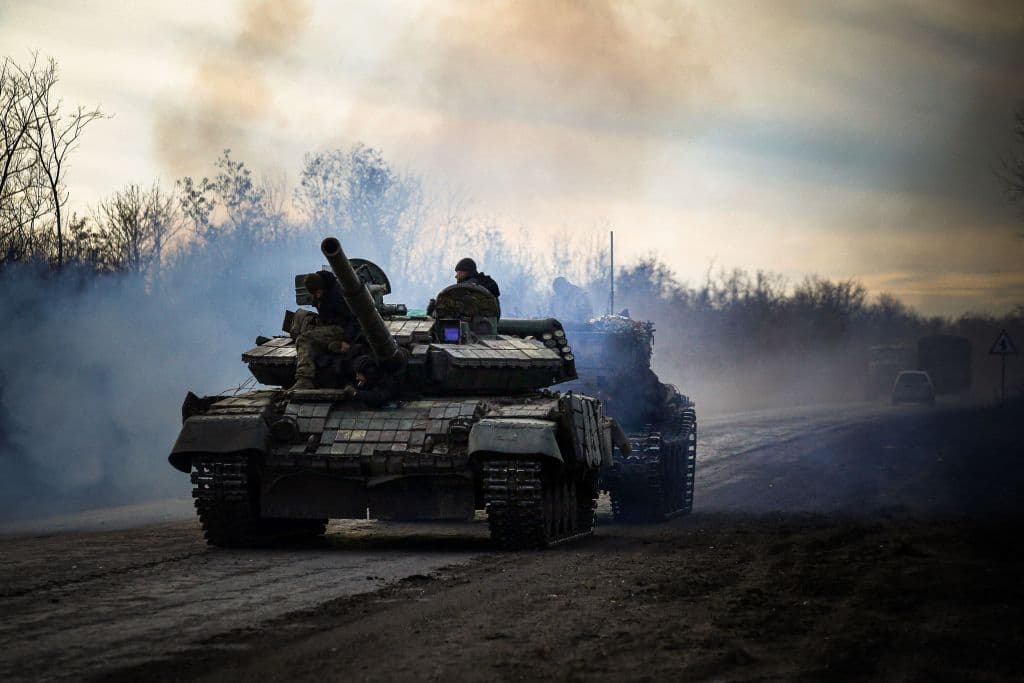Ukraine war latest: Ukraine says Russia losing over 50 troops daily near Bakhmut as fiercest battle grinds on

Key developments on Dec. 4:
- Ukraine's military estimates 50-100 Russian troops killed near Bakhmut each day
- Evacuation for residents living on the east bank of Dnipro River in Kherson Oblast underway
- Kremlin says it would not comply with $60 oil cap; Kyiv demands it to be lowered to $30
- Ukraine calls against security guarantees to Russia after Macron’s statement
Russia is losing from 50 to 100 soldiers each day in the battle of Bakhmut amid its desperate attempts to capture the city in the eastern Donetsk Oblast, a military spokesman said on Dec. 4.
Speaking on TV, Eastern Military Command spokesman Serhiy Cherevaty said that about as many Russian soldiers get wounded in action near Bakhmut daily.
For months, Russia has massed troops and equipment to surround and capture Bakhmut in a brutal campaign participated by the Russian state-backed military company Wagner Group.
“It’s a very difficult situation” but Ukrainian forces are holding out against the attacks, according to Cherevaty.
Moscow doesn’t publish its military casualties. It has not publicly commented on Ukraine’s estimate of its casualty rate in the Bakhmut sector.
Once home to 70,000 people, the salt-mining city of Bakhmut has become the center of the battle in the east of Ukraine in August. It is located on a main road to Kramatorsk and Sloviansk – key cities in Donetsk Oblast that Moscow aims to capture despite its stalled progress.
Following the Russian Defense Ministry’s earlier report of capturing two Ukrainian settlements near Bakhmut, the U.K. Defense Ministry said on Dec. 3 that Russia had “highly likely” made small gains south of the city in recent days.
The U.K. Defense Ministry said that Russia likely plans to encircle Bakhmut with “tactical advances to the north and the south” but the campaign has been “disproportionately costly relative to these possible gains.”
In neighboring Luhansk Oblast, Governor Serhiy Haidai said counteroffensive operations continue in the Svatove and Kreminna directions in the largely Russian-occupied region.
Down in the country’s south in Kherson Oblast, Ukrainian authorities are urging residents on the eastern bank of the Dnipro River to evacuate as Russian shelling of the area intensifies.
Anticipating “possible intensification of hostilities” in the Russian-occupied areas of the region, Kherson Oblast Governor Yaroslav Yanushevych on Dec. 3 called upon locals to get to a designated point to be evacuated to the Ukrainian-controlled city of Kherson.
Kherson, however, also remains a target of Russian shelling. On Dec. 4, Russian forces shelled a central part of the liberated regional capital, damaging an apartment building and a gas pipeline. No casualties were reported.
Russian oil cap
Russia said it would not comply with the decision reached by Western nations on Dec. 2 to cap the price of Russian oil at $60 per barrel, while Ukraine criticized it as being “weak.”
The G7, EU, and Australia agreed on the cap to curb Russia’s revenue from selling oil – its main export – and fund its war in Ukraine.
An embargo on Russian seaborne oil approved by the EU in June will take effect on Dec. 5, while the U.S., U.K., Canada, and Australia have already banned Russian oil.
Under the oil cap terms, non-Western countries can import seaborne Russian oil as long as it is sold below $60 per barrel. On Dec. 2, Russian Urals crude was trading at about $67 per barrel, Reuters reported.
On Dec. 4, Deputy Prime Minister of Russia Alexander Novak said on state TV channel Rossiya 24 that Moscow would not go along with the oil cap.
Russian state-controlled news agency TASS reported earlier that Russia “will not accept” the oil cap but some preparations are nevertheless underway, quoting Kremlin spokesman Dmitry Peskov.
Meanwhile, Ukraine is pushing for a lower oil cap of $30, as Poland and the Baltic states proposed.
“You can’t call serious a decision on capping Russian prices that is completely comfortable for the budget of the terrorist state,” President Volodymyr Zelensky said in an evening address on Dec. 3.
Security guarantees
As Western leaders signal toward negotiations to end the war in Ukraine, Kyiv officials explained once again why they chose to “negotiate” on the battlefield.
Oleksiy Danilov, secretary of the National Security and Defense Council, called against granting security guarantees to Russia, countering French President Emmanuel Macron’s earlier statement.
“They want to provide a terrorist and killer country with security guarantees?” Danilov said on Facebook. “This is the strange logic of undercover diplomacy, the time of which is over.”
Danilov said that it’s the world that should receive security guarantees from Russia, not the other way around.
On Dec. 3, Macron said that the West should consider providing Russia with guarantees should Russian President Vladimir Putin agree to pursue negotiations to end the war.
In a TV interview, Macron added that Europe needs to prepare “how to give guarantees to Russia the day it returns to the negotiating table” for its future security architecture.
His statement received immediate backlash from Ukraine.
Late on Dec. 3, David Arakhamia, Ukraine’s chief negotiator with Russia, said Kyiv would only be ready to provide security guarantees to Moscow after a complete Russian military withdrawal and if “all war criminals” are brought to justice. The other conditions he listed were Moscow paying reparations and voluntarily surrendering nuclear weapons.
Earlier this week, U.S. President Joe Biden, speaking alongside Macron during a state visit, said he was ready to talk with Putin if Russia was ready to end its war.
The Kremlin turned down Biden’s offer, saying that it was open for talks “to achieve our goals” in Ukraine but it has no intentions to end the war, spokesman Peskov said.









